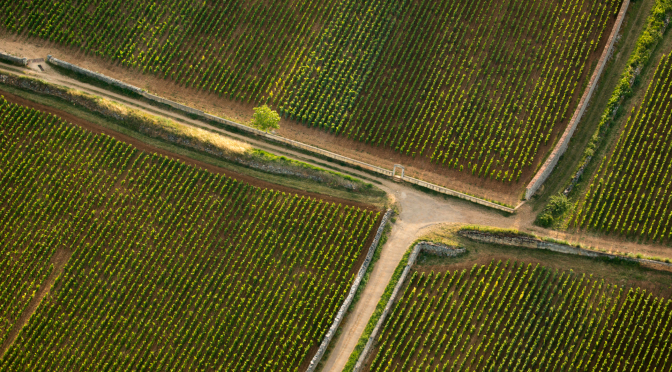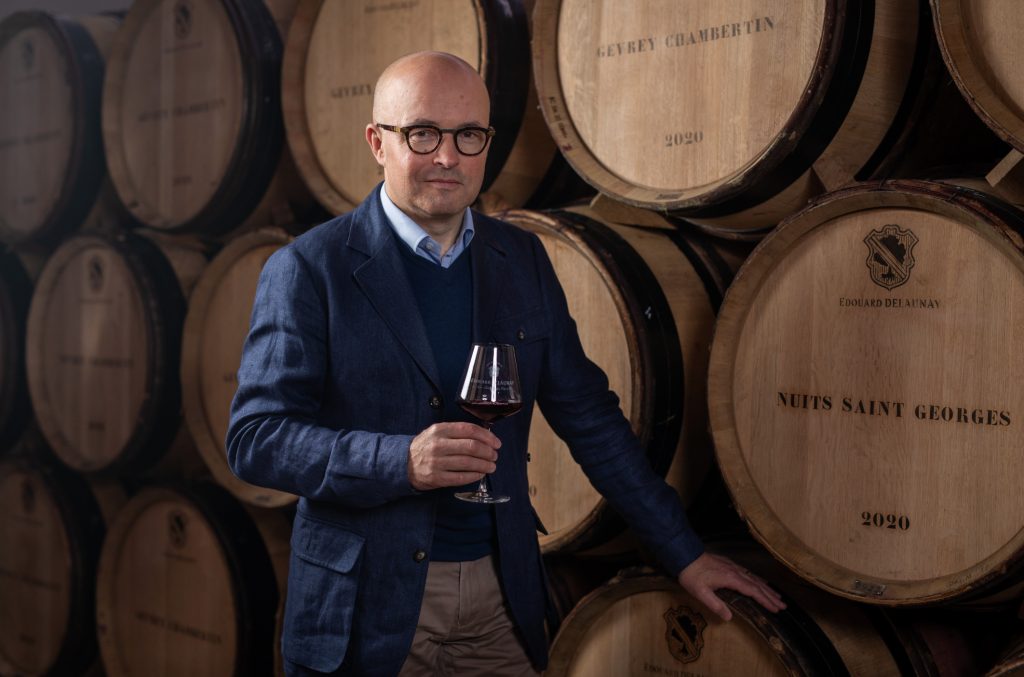Photo : Laurent Delaunay © BIVB / Antoine Martel
Photo : Bourgogne Vineyard © BIVB / Aurélien Ibanez
Laurent Delaunay – The new Chairman of the BIVB
On Friday, December 15, the Bourgogne Wine Board (BIVB) held its traditional end-of-year General Meeting.
The first part of the meeting was devoted to signing off the accounts for the 2022-2023 financial year and taking stock of its activities.
The second part saw the transfer of power from François Labet to Laurent Delaunay. Mr Delaunay, of the négoce family, becomes Chairman of the BIVB for the next two years. François Labet, who has held the position since 2021, will assist him as Co- Chairman.
Mr Delaunay immediately took the floor to congratulate some of his predecessors, in particular Pierre-Henry Gagey, Frédéric Drouhin and the late Louis-Fabrice Latour: “They are the people who ‘trained’ me and made me want to give something back to the industry…,” he said. He also asked for a minute’s silence as a tribute to Pau Roca, Director of the OIV (International Organisation of Vine and Wine), who died the previous week, saying: “I would like to pay tribute to this staunch defender of the industry, both within the Spanish Wine Federation and during his term of office at the OIV, where he played an important role, recognised by all. He was the driving force behind the OIV coming to Dijon and the organisation of the 2024 Congress (see further below).”
The new Chairman then turned to his new role, saying: “Our Wine Board is a complex entity: it brings together many different areas of expertise and is made up of professionals at the top of their game who we can call on. It also interacts with a whole ecosystem and a large number of interlocutors (at local, regional, national and international levels).”
He then outlined some of the priorities for the next two years:
- THE ENVIRONMENT, which requires the BIVB to have “our plan Objectif Climat (where reducing the Bourgogne wine industry carbon emissions is the goal) at the centre of our roadmap”. Having validated the main areas of action in June 2023, “we now need to roll out our plan step by step”.He said to achieve this, the industry’s many partners needed to be involved in the process: “We won’t be able to succeed in our carbon plan without involving all those working in associated industries (coopers, manufacturers and distributors of vineyard and wine-making equipment, manufacturers of dry materials etc.)” This, he said, is likely to involve “platforms for discussion and consultation”.
Mr Delaunay is also calling for discussions in the form of conferences to be held in the heart of the vineyards to present “innovative initiatives linked to ecological transition (…) There is an incubator for ideas and skills here that we need to develop.”
- THE ECONOMIC MANAGEMENT OF THE SECTOR. Mr Delaunay said he aspires to “modernise our approach to the sector through contractual practices and the economic regulation of our supply”. To cope with fluctuations in Bourgogne’s wine production, “we need to think collectively (…) about the tools we can put in place to move from marketing a harvest that we are working on, to marketing an available product that is controlled over the medium term according to our commercial needs. These tools already exist. We don’t have to invent anything, other than a will to harness them together in the interests of our two families.”
- Improving COMMUNICATION IN THE INDUSTRY, to better disseminate the economic and technical information available, “perhaps by relying more on the families who maintain daily links with their members”.
- DEFENDING APPELLATIONS, especially internationally, for which “we need to be our own watchdogs and set up simple, responsive procedures.”
Mr Delaunay knows he can rely on François Labet, his co-Chairman, with whom he has an excellent relationship, to move forward on these issues.
Laurent Delaunay – nouveau Président du Bureau Interprofessionnel des Vins de Bourgogne (BIVB)
Lors de l’assemblée générale de l’interprofession des vins de Bourgogne, le 15 décembre dernier, Laurent Delaunay a succédé à François Labet en devenant Président du BIVB.
Laurent Delaunay a rendu hommage à ses prédécesseurs, Pierre-Henry Gagey, Frédéric Drouhin et Louis-Fabrice Latour, soulignant leur influence sur son engagement envers la filière. Un moment solennel s’en est suivi, avec une minute de silence en hommage à Pau Roca, Directeur de l’OIV (Organisation Internationale de la Vigne et du Vin) récemment décédé. Laurent Delaunay a salué son rôle majeur dans l’installation du siège de l’OIV à Dijon et dans l’organisation de son congrès en octobre 2024, également à Dijon. Cet événement sera l’occasion de célébrer le centenaire de l’institution internationale.
Le Président a évoqué ses nouvelles missions et priorités, mettant en avant le plan « Objectif Climat » au cœur de sa feuille de route. Il a souligné la nécessité d’impliquer tous les acteurs de la filière dans cet objectif de neutralité carbone, proposant des plateformes d’échange et des conférences-débats au vignoble pour promouvoir la transition écologique.
Niveau économique, il a plaidé pour la modernisation de la filière, notamment par des pratiques contractuelles et la régulation économique de l’offre. Il a appelé à une réflexion collective sur des outils permettant de mieux gérer les fluctuations de la production.
En matière de communication, le Président souhaite améliorer la diffusion des informations économiques et techniques. Enfin, il a souligné l’importance de défendre les appellations à l’international, encourageant la mise en place de procédures simples et réactives.
Le BIVB s’engage dans un avenir axé sur l’environnement, la modernisation économique, une communication renforcée et une défense vigoureuse des appellations bourguignonnes à l’échelle mondiale. Un nouveau chapitre passionnant s’ouvre pour la filière viticole bourguignonne !


